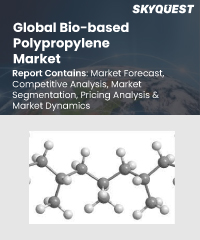
Product ID: SQMIG15E2352

Report ID:
SQMIG15E2352 |
Region:
Global |
Published Date: April, 2024
Pages:
165
|
Tables:
65 |
Figures:
79
Bio-based Polypropylene Market Driver
Growing demand from the packaging industry for bio-based polypropylene will support bio-based polypropylene market expansion.
Bio-based Polypropylene Market Restraint
Availability of substitute materials including polylactic acid and bio-based PET is projected to limit the market
Our industry expert will work with you to provide you with customized data in a short amount of time.
REQUEST FREE CUSTOMIZATIONBio-based Polypropylene Market size was valued at USD 38.99 million in 2019 and is poised to grow from USD 41.18 million in 2023 to USD 63.7 million by 2031, growing at a CAGR of 5.6% in the forecast period (2024-2031).
Want to customize this report? This report can be personalized according to your needs. Our analysts and industry experts will work directly with you to understand your requirements and provide you with customized data in a short amount of time. We offer $1000 worth of FREE customization at the time of purchase.

Product ID: SQMIG15E2352